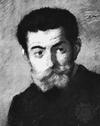- Huysmans, Joris-Karl
-
born Feb. 5, 1848, Paris, Francedied May 12, 1907, ParisHis early works, influenced by contemporary naturalism, were followed by far more individual and violent works. The first was Down Stream (1882). His best-known novel, À rebours (1884; Against the Grain), relates experiments in decadence by the bored survivor of a noble line. The controversial and clearly autobiographical Là-bas (1891; Down There) is a tale of 19th-century satanists. His final novels concern his return to Roman Catholicism. He also wrote perceptive art criticism.
 Joris-Karl Huysmans, detail of an oil painting by Jean-Louis Forain.J.E. Bulloz
Joris-Karl Huysmans, detail of an oil painting by Jean-Louis Forain.J.E. Bulloz* * *
▪ French authororiginal name Charles-Marie-Georges Huysmansborn Feb. 5, 1848, Paris, Fr.died May 12, 1907, ParisFrench writer whose major novels epitomize successive phases of the aesthetic, spiritual, and intellectual life of late-19th-century France.The only son of a French mother and a Dutch father, Huysmans at 20 began a long career in the Ministry of the Interior, writing many of his novels on official time (and notepaper). His early work, influenced by contemporary naturalist novelists, include a novel, Marthe, histoire d'une fille (1876; Marthe), about his liaison with a soubrette, and a novella, Sac au dos (1880; “Pack on Back”), based on his experience in the Franco-German War. The latter was published in Les Soirées de Médan (1881), war stories written by members of Émile Zola's “Médan” group of naturalist writers. Huysmans soon broke with the group, however, publishing a series of novels too decadent in content and violent in style to be considered examples of naturalism.The first was À vau-l'eau (1882; Down Stream), a tragicomic account of the misfortunes, largely sexual, of a humble civil servant, Folantin. À rebours (1884; Against the Grain), Huysmans' best-known novel, relates the experiments in aesthetic decadence undertaken by the bored survivor of a noble line. The ambitious and controversial Là-bas (1891; Down There) tells of the occultist revival that occurred in France in the 1880s. A tale of 19th-century satanists interwoven with a life of the medieval satanist Gilles de Rais, the book introduced what was clearly an autobiographical protagonist, Durtal, who reappeared in Huysmans' last three novels: En route (1895), an account of Huysmans-Durtal's religious retreat in the Trappist monastery of Notre-Dame d'Igny and his return to Roman Catholicism; La Cathédrale (1898; The Cathedral), basically a study of Nôtre-Dame de Chartres with a thin story attached; and L'Oblat (1903; The Oblate), set in the Benedictine abbey of Ligugé, near Poitiers, in the neighbourhood in which Huysmans lived in 1899–1901 as an oblate (lay monk).The chief fascination of Huysmans' work lies in its autobiographical content. Together his novels tell the story of a protracted spiritual odyssey. In each the hero tries to find happiness in some kind of spiritual and physical escapism; each ends on a note of disappointment and revolt until, in L'Oblat, Huysmans and his hero acknowledge that escapism is not only futile but wrong. Huysmans exemplified his hard-won belief in the value of suffering in his courageous bearing during the months of pain that preceded his death from cancer.Also a perceptive art critic, Huysmans helped win public recognition of the Impressionist painters (L'Art moderne, 1883; Certains, 1889). He was the first president of the Goncourt Academy, which annually awards a prestigious French literary prize.Additional ReadingRobert Baldick, The Life of J.K. Huysmans (1955, reissued 2006); James Laver, The First Decadent: Being the Strange Life of J.K. Huysmans (1954); George Ross Ridge, Joris-Karl Huysmans (1968); Brian R. Banks, The Image of Huysmans (1990).* * *
Universalium. 2010.
